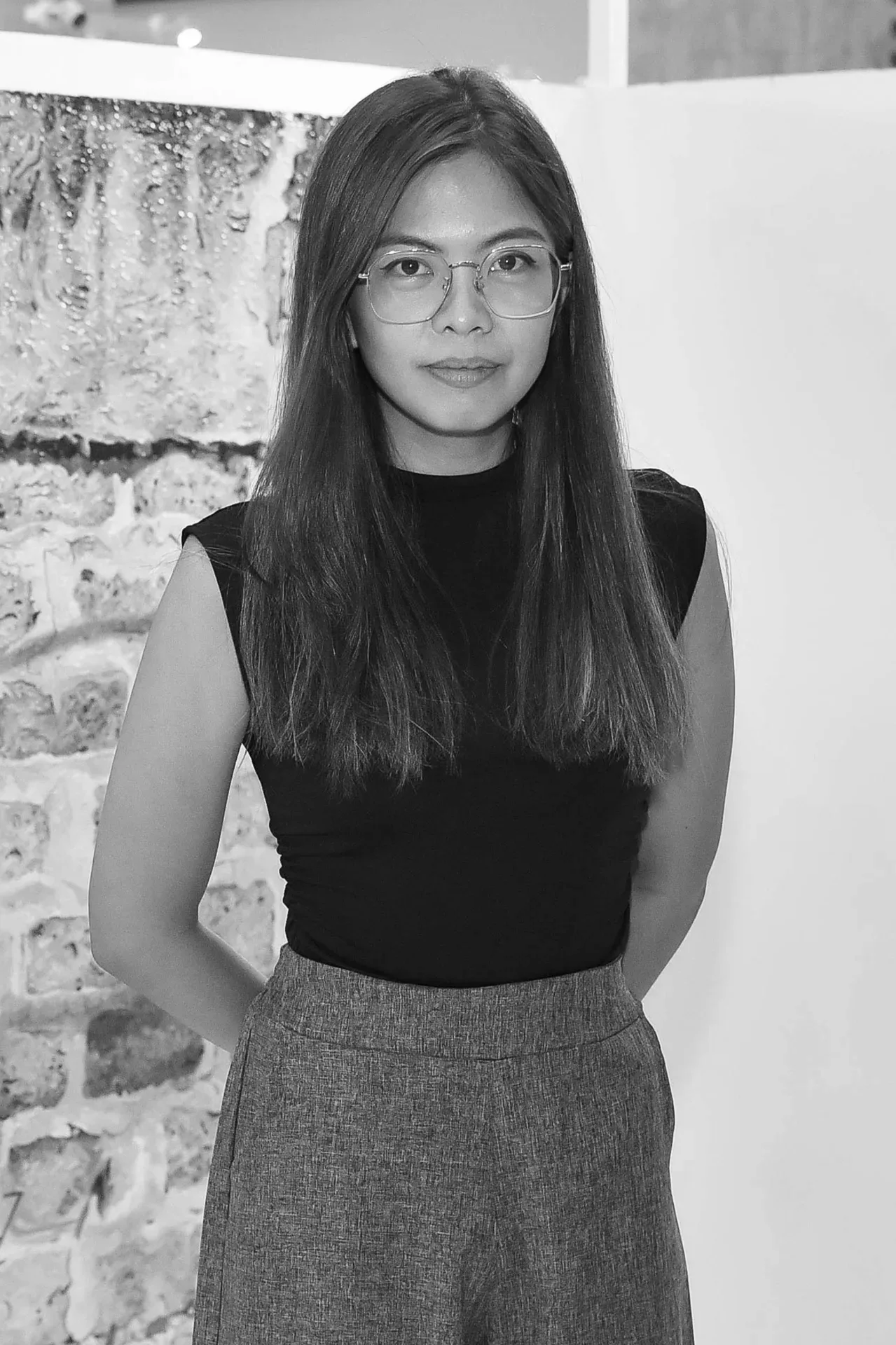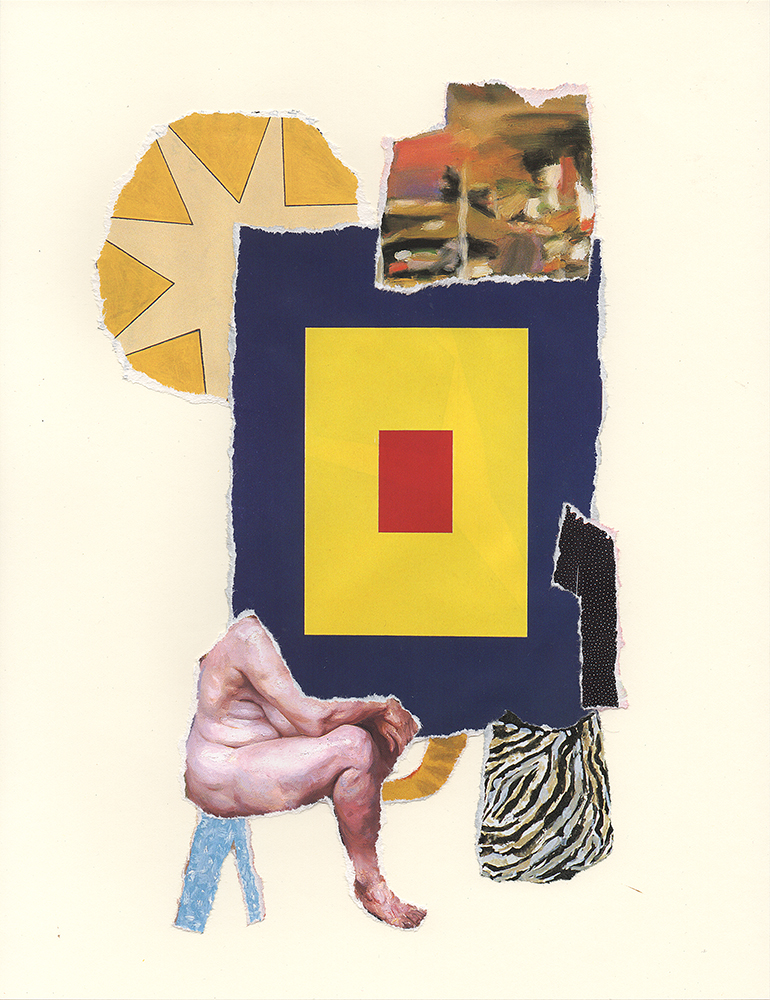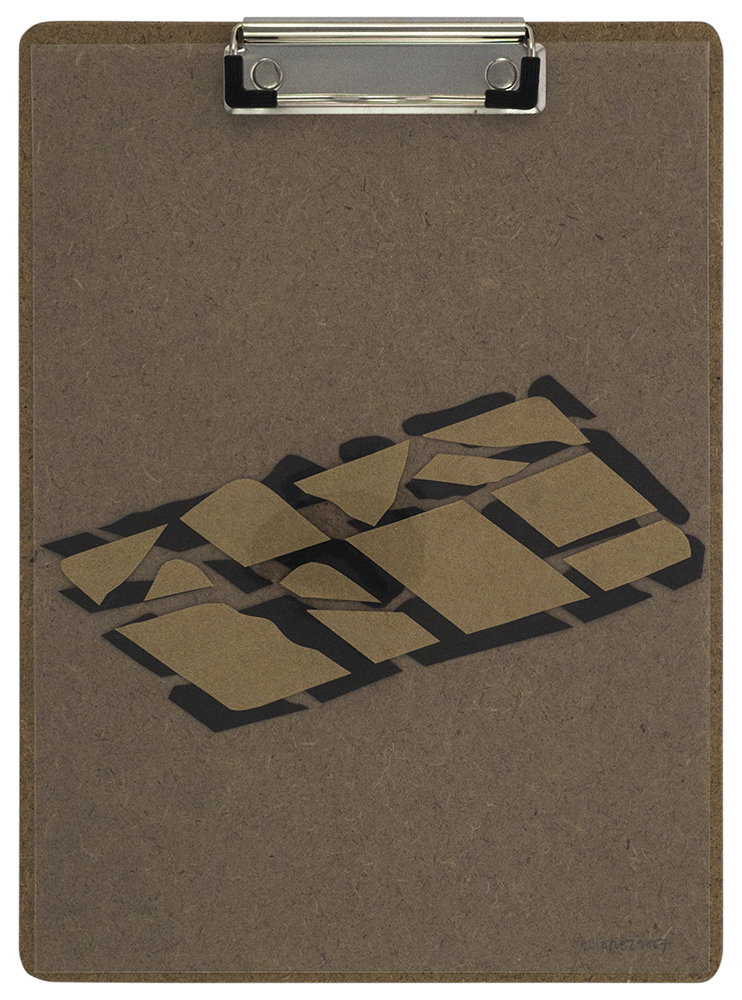MO_Space X: Fresh Cut, New Blood
Various Artists
Jan Balquin, Dina Gadia, Jacob Lindo, Carina Santos, Jel Suarez
Jan Balquin, Dina Gadia, Jacob Lindo, Carina Santos, Jel Suarez
05 August – 03 September 2017
Curated by
Gary-Ross Pastrana
05 August – 03 September 2017

Exercise 5: Cut out one particular shape or pattern. Using different materials, colors, textures, and transparency, continue cutting out that one particular shape; you can repeat the same shape in varying sizes. Collage and layer the shapes onto a piece of paper.
This is one artist’s instruction to another artist. The artist who gives the instruction poses as teacher, while the receiver of the instruction acts as her student. The instruction given is for producing a kind of artwork known as collage. Although the designation of titles—of teacher and student—pertains to an instigator and doer, both, in actuality, participate as decoders: one through the abstract landscape of ideas, while the other through heaps of tactile paper.
Collage’s suitability to beset within certain parameters without compromising the multifariousness of its result makes it an ideal exercise for exploring the visual landscape. Shapes, colors, and patterns; process, repetition, and conditions combine as the enigma to be solved. It is a riddle in reverse where the answer comes first to initiate questioning. The question, the resulting product which is a rabble of incoming queries via cut paper, asks: why do you see?
Artist and curator Gary Pastrana, who himself works with collage, has observed a kind of peculiarity in the steady adherence by a number of artists to the form. Gaining prominence during the latter stages of modernism, collage since then has continued to become a welcome diversion for local artists exploring different media. “I believe that this is something peculiar to the Philippines, ”according to Pastrana. “I have surveyed other cities and art institutions across the region and beyond, but haven’t found any indication of a similar, continued interest in collage among contemporary artists.” He then goes on to infer that this may be a direct result of Roberto Chabet’s classroom exercises.
Exercise 3: Make a collage from only two sources of its kind: two magazine pages, two materials, two photographs, two flyers, etc.
During his 30-year tenure as a professor at the College of Fine Arts, the University of the Philippines, Diliman, Chabet became known for pushing his students to exhaust all possibilities of a single idea via repeated executions. For him, the processes that went behind these permutations were more important than the finished product. These pedagogic exercises usually came in the form of collages, which, Pastrana posits, would explain the continuing interest among younger artists—even to those who were never taught by Chabet.
Fresh Cut, New Blood shows how Chabet’s influence has spread from one generation of artists to the next and revisits the method of instruction as a liberating, rather than a limiting, factor. The focus on young, next-generation artists featured in the show attests to collage’s capacity to explore, scavenge, and decode the tumult found in the present visual landscape. Featuring both new works in collage and exercises done from a set of instructions, Fresh Cut, New Blood is a testament to both collage and Chabet’s influence explored through a pedagogic mode of exhibition with artworks by Jan Balquin, Dina Gadia, Jacob Lindo, Carina Santos, and Jel Suarez; and instructions from Mariano Ching, Yasmin Ching, and Gary Pastrana.
About the Artist
About the Artists

Dealing with concepts of value, materiality, and banality, Jan Balquin works across different media ranging from paintings to collage. Exploring conventional notions of material and subject matter vis-a-vis unconventional imagery and simulacra, her recent paintings expand into sculptural forms that interrogate the qualities of the blank canvas as an object.
An alumna of the Philippine High School for the Arts, Balquin (b.1989) graduated with a degree in Fine Arts from the University of the Philippines, Diliman, having received a grant to pursue her thesis.

Dina Gadia (b. 1986, Pangasinan, Philippines) currently lives and works in Manila. She graduated from Far Eastern University Manila with a Bachelor of Fine Arts, majoring in Advertising in 2006.
Gadia primarily works in the medium of collage. Her works are sophisticated re-imaginations of found materials including images and texts from comic books, movie posters, and advertisements that are composed into coherent and compelling narratives. Visually arresting with a style that exploits the familiar, in playing with signs and language culled from popular printed matter and other quotidian expression, the works of Dina Gadia are imaginative subversions of cultural codes, featuring collaged realities and altered bodies that bespeak of gender issues and sexuality, taste, and identity, of the official and the outsider, fine art and lowbrow culture, authorship and subjectivity, all done with a touch of whimsy and a sense of wonder for everything strange and absurd. Gadia’s paintings remarkably capture the tone of the cryptic angsts and uncertainties of her subject matter, the lost and inchoate expressions of an oblivious community, applying a touch that is removed from sentimentality or self-righteous judgment. Doing so, the artist employs tropes of illustration and design to remove the proverbial weight of the author’s hand, a postmodern resolve that Gadia has mastered.
She began exhibiting her works in group shows in 2005. Since then, she has had several solo exhibitions in the Philippines. Silverlens Gallery presented Adaptable to New Redundancies in 2013 in its Gillman Barracks space in Singapore. Philippines-based Blanc Gallery organized How Does That Grab You Darling back in 2010, and Let’s Talk about Feelings in 2014.

Carina Santos (b. 1988, Manila) is an artist, writer, and designer. She finished her Bachelor’s Degree in Fine Arts in Information Design from Ateneo de Manila University in 2010. She also finished her Master of Research on Art in Theory & Philosophy at Central Saint Martins, University of the Arts London in 2019. Santos has written numerous articles and contributions for local / international media such as Rogue Magazine, Esquire Philippines, CNN Philippines Life, The Philippine Star, and Warner Music Philippines.
As an artist, Santos had solo and group exhibitions since 2009 at West Gallery, Secret Fresh Gallery, Lightbombs Contemporary (Hong Kong), Silverlens Galleries, Finale Art File, and Blanc Gallery to name a few. She has also participated at the Art Fair Philippines.

Jel Suarez (b. 1990) is a self-taught artist born and based in Manila. Her practice is anchored on collage as an act of excavation, beginning with a hunt for materials ripe with narrative (books, catalogues, and archives). She gathers fragments of their histories as a form of creative inquiry. In mining these collections and cutting parts of wholes, she considers chipping away time and releasing artefacts from older lives.
Images occupy new topographies. Compositions are densely populated by slices of color and texture—forms hinting at histories yet decidedly hovering outside time. Their contours similarly evoke nature’s harder relics such as stones and marbles baring their jagged edge. Suarez approaches collage as a way of reading, reinterpreting and responding to a visual phenomenon by restating images as open codes and new texts in the process of becoming.
Suarez has been exhibiting her works since 2014, and has participated in art fairs in Manila (ALT Philippines 2020; Art Fair PH 2016-19), Hong Kong (Art Central HK 2017), and Singapore (AAF SG 2014). She was an artist-in-residence of Larga (Negros Occ, PH) in 2019, and at Rimbun Dahan (Selangor, MY) in 2017.
Her solo exhibitions with West Gallery (2018) and MO_Space Gallery (2019) were shortlisted for the Ateneo Art Awards, where she became the first recipient of it’s Italian Embassy’s Purchase Prize.
Related Exhibitions
About the Artists
About the Artist
Dealing with concepts of value, materiality, and banality, Jan Balquin works across different media ranging from paintings to collage. Exploring conventional notions of material and subject matter vis-a-vis unconventional imagery and simulacra, her recent paintings expand into sculptural forms that interrogate the qualities of the blank canvas as an object.
An alumna of the Philippine High School for the Arts, Balquin (b.1989) graduated with a degree in Fine Arts from the University of the Philippines, Diliman, having received a grant to pursue her thesis.

Dina Gadia (b. 1986, Pangasinan, Philippines) currently lives and works in Manila. She graduated from Far Eastern University Manila with a Bachelor of Fine Arts, majoring in Advertising in 2006.
Gadia primarily works in the medium of collage. Her works are sophisticated re-imaginations of found materials including images and texts from comic books, movie posters, and advertisements that are composed into coherent and compelling narratives. Visually arresting with a style that exploits the familiar, in playing with signs and language culled from popular printed matter and other quotidian expression, the works of Dina Gadia are imaginative subversions of cultural codes, featuring collaged realities and altered bodies that bespeak of gender issues and sexuality, taste, and identity, of the official and the outsider, fine art and lowbrow culture, authorship and subjectivity, all done with a touch of whimsy and a sense of wonder for everything strange and absurd. Gadia’s paintings remarkably capture the tone of the cryptic angsts and uncertainties of her subject matter, the lost and inchoate expressions of an oblivious community, applying a touch that is removed from sentimentality or self-righteous judgment. Doing so, the artist employs tropes of illustration and design to remove the proverbial weight of the author’s hand, a postmodern resolve that Gadia has mastered.
She began exhibiting her works in group shows in 2005. Since then, she has had several solo exhibitions in the Philippines. Silverlens Gallery presented Adaptable to New Redundancies in 2013 in its Gillman Barracks space in Singapore. Philippines-based Blanc Gallery organized How Does That Grab You Darling back in 2010, and Let’s Talk about Feelings in 2014.

Carina Santos (b. 1988, Manila) is an artist, writer, and designer. She finished her Bachelor’s Degree in Fine Arts in Information Design from Ateneo de Manila University in 2010. She also finished her Master of Research on Art in Theory & Philosophy at Central Saint Martins, University of the Arts London in 2019. Santos has written numerous articles and contributions for local / international media such as Rogue Magazine, Esquire Philippines, CNN Philippines Life, The Philippine Star, and Warner Music Philippines.
As an artist, Santos had solo and group exhibitions since 2009 at West Gallery, Secret Fresh Gallery, Lightbombs Contemporary (Hong Kong), Silverlens Galleries, Finale Art File, and Blanc Gallery to name a few. She has also participated at the Art Fair Philippines.

Jel Suarez (b. 1990) is a self-taught artist born and based in Manila. Her practice is anchored on collage as an act of excavation, beginning with a hunt for materials ripe with narrative (books, catalogues, and archives). She gathers fragments of their histories as a form of creative inquiry. In mining these collections and cutting parts of wholes, she considers chipping away time and releasing artefacts from older lives.
Images occupy new topographies. Compositions are densely populated by slices of color and texture—forms hinting at histories yet decidedly hovering outside time. Their contours similarly evoke nature’s harder relics such as stones and marbles baring their jagged edge. Suarez approaches collage as a way of reading, reinterpreting and responding to a visual phenomenon by restating images as open codes and new texts in the process of becoming.
Suarez has been exhibiting her works since 2014, and has participated in art fairs in Manila (ALT Philippines 2020; Art Fair PH 2016-19), Hong Kong (Art Central HK 2017), and Singapore (AAF SG 2014). She was an artist-in-residence of Larga (Negros Occ, PH) in 2019, and at Rimbun Dahan (Selangor, MY) in 2017.
Her solo exhibitions with West Gallery (2018) and MO_Space Gallery (2019) were shortlisted for the Ateneo Art Awards, where she became the first recipient of it’s Italian Embassy’s Purchase Prize.

Related Exhibitions

Share













.jpg)







































































